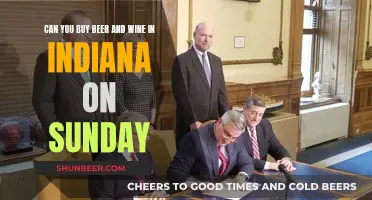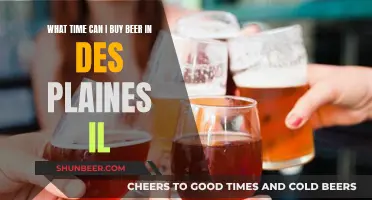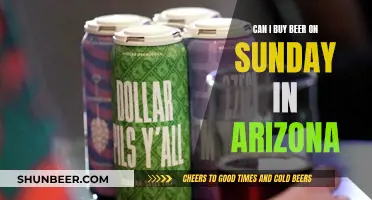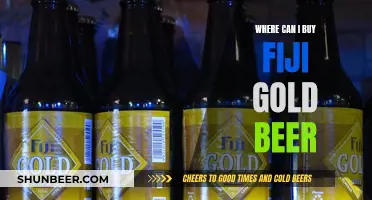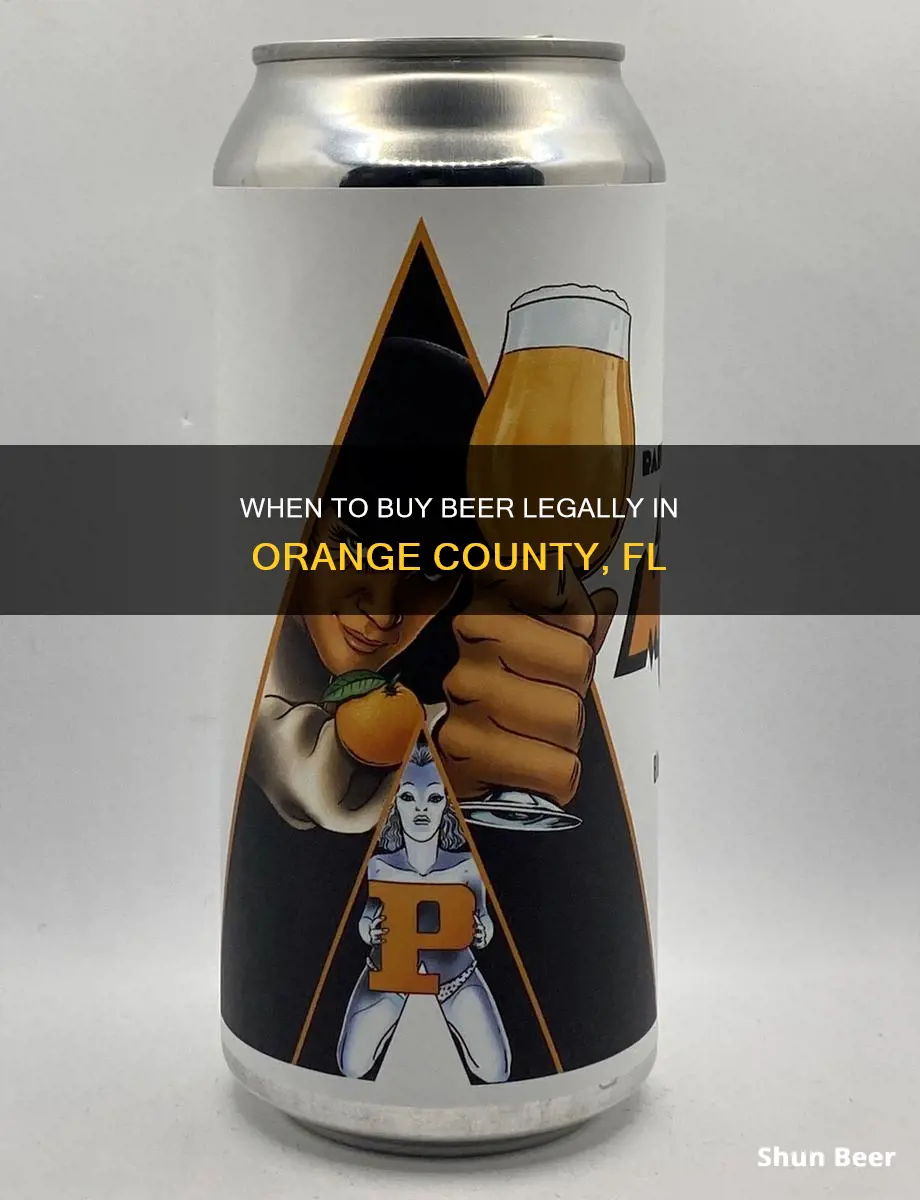
Florida's alcohol laws can be confusing, especially when it comes to Sunday sales. While the state sets default hours for alcohol sales, counties and municipalities are allowed to set their own rules, resulting in varying last call times across the state. In Orange County, Florida, the sale of packaged alcoholic beverages is permitted between 9:00 a.m. and 2:00 a.m., seven days a week. However, bars and restaurants in unincorporated areas of the county are allowed to serve alcohol from 11:00 a.m. to 2:00 a.m. daily, with some exceptions for New Year's Eve and golf courses.
| Characteristics | Values |
|---|---|
| Hours of sale for liquor stores, gas stations, and supermarkets in unincorporated areas | 9:00 a.m. to 2:00 a.m., any day of the week |
| Hours of sale for bars and restaurants in unincorporated areas | 11:00 a.m. to 2:00 a.m., any day of the week |
| Hours of sale for bars and restaurants in unincorporated areas on New Year's Eve | The county commission can set extended hours |
| Hours of sale for bars and restaurants on golf courses | 7:00 a.m. to sunset |
| Hours of sale for bars and restaurants in Orlando | Until midnight without a special permit |
| Hours of sale for bars and restaurants in Orlando with a special permit | After midnight |
| Hours of sale in other Florida municipalities | 7:00 a.m. to 3:00 a.m. |
| Statewide default hours of sale | 7:00 a.m. to midnight |
What You'll Learn

Alcohol sales in bars and restaurants
In Orange County, Florida, the hours during which alcohol sales are permitted in bars and restaurants are from 11:00 a.m. to 2:00 a.m. every day of the week. However, there are a few exceptions to this rule. For example, on New Year's Eve, the county commission has the authority to extend the hours of service for alcoholic beverages. Additionally, at golf courses, alcohol may be served between 7:00 a.m. and sunset.
It is important to note that these hours apply specifically to unincorporated areas within Orange County. Incorporated places within the county typically have the authority to set their own hours of sale for alcohol. For example, in downtown Orlando, bars are no longer allowed to sell alcohol after midnight unless they obtain a special permit and implement enhanced security measures. These new rules were implemented in May 2023 due to safety concerns in the area.
The laws regarding alcohol sales in Florida can vary from county to county, and even within different cities and municipalities. While the statewide default hours for alcohol sales are from 7:00 a.m. to midnight, many counties and municipalities have made adjustments to these default hours. Some areas allow sales until 2:00 a.m. or 3:00 a.m., while others may have earlier closing times. A few specific counties, like Miami-Dade, even permit 24-hour alcohol sales in certain locations.
To ensure compliance with local regulations, it is recommended that individuals check the websites of their county or municipality, or contact the local Alcoholic Beverage Control (ABC) board, to confirm the specific hours during which alcohol sales are permitted in bars and restaurants. These regulations are subject to change, so staying informed about the most current laws is important for businesses and consumers alike.
Duff Beer: Can Aussies Buy Homer's Favorite Beverage?
You may want to see also

Buying alcohol with a fake ID
In Orange County, Florida, packaged alcoholic beverages may be sold between 9:00 a.m. and 2:00 a.m. on Sundays, and between 7:00 a.m. and 2:00 a.m. from Monday to Saturday. However, grocery stores tend to close before 2:00 a.m. and usually stop selling alcohol after 9:00 p.m.
If you are considering using a fake ID to buy alcohol in Orange County, or anywhere else, it is important to be aware of the potential risks and consequences. Using a fake ID is a serious offence and, although many instances go unnoticed, if you are caught, you could face severe penalties.
A fake ID is considered any form of identification that is forged, altered, or used to establish a false identity. This includes using a real ID that does not belong to you. Fake ID laws cover a wide range of activities, including making, selling, purchasing, using, and possessing false documents, as well as fraudulent use of a real ID.
The penalties for using a fake ID vary depending on the state and the specific circumstances of the offence. In Florida, buying alcohol or attempting to buy alcohol with a forged ID carries a maximum penalty of a $5,000 fine and up to five years in prison. If you lend your ID to someone else, you can also be fined $500 and jailed for 60 days.
In most cases, using a fake ID is considered a misdemeanour offence, which can result in fines of up to $1,000 and up to a year in jail. However, in some states, using a fake ID can result in felony charges, with penalties of up to $100,000 in fines and up to 10 years in prison. Additionally, if you are convicted of a felony, it will remain on your record for life, impacting your education and career opportunities.
If you are caught with a fake ID, it is in your best interest to speak to a local criminal defence lawyer as soon as possible to understand your rights and the potential consequences you are facing.
Buying Beer in South Carolina: Morning Restrictions
You may want to see also

Alcohol sales in grocery stores
The laws regarding alcohol sales in Florida can be complex, and they may differ across counties and municipalities. Generally, alcohol sales are prohibited between 3:00 a.m. and 7:00 a.m. every day, with some counties, like Miami-Dade, permitting 24/7 sales in certain areas. Additionally, there are specific rules for establishments like bars and restaurants, which are allowed to serve alcohol from 11:00 a.m. to 2:00 a.m. daily in unincorporated areas of Orange County.
It is worth noting that Florida has a default statewide law that applies in the absence of local regulations. This law sets the hours for alcohol sales from 7:00 a.m. to midnight each day. However, counties and municipalities can enact their own ordinances, resulting in variations across the state. For instance, some areas may have earlier closing times, while others allow sales until 2:00 a.m. or 3:00 a.m.
To ensure compliance, it is essential to refer to the specific regulations of the county or municipality in question. This information can be found on the official websites of local governments or by contacting the local Alcoholic Beverage Control (ABC) board. Understanding the local laws is crucial to navigate the intricacies of alcohol sales and consumption in Florida.
Furthermore, it is important to highlight that the legal age for purchasing and consuming alcohol in Florida is 21 years or older. The state imposes strict penalties for violations, including fines and jail time. Additionally, employees must be at least 18 years old to work in areas of an establishment that sell or serve alcohol, and establishments must ensure that they do not serve alcohol to minors.
Buying Beer in Georgia: Christmas Day Restrictions
You may want to see also

Alcohol sales on Sundays
Alcohol sales laws in Florida can be confusing, especially when it comes to Sundays. The state's default position is that alcohol sales are prohibited between 12 a.m. and 7 a.m. every day, with some counties and municipalities allowed to set their own hours.
In Orange County, Florida, packaged alcoholic beverages may be sold between 9 a.m. and 2 a.m. any day of the week, including Sundays. Alcoholic beverages can be served in bars and restaurants in the county between 11 a.m. and 2 a.m. every day. However, there are exceptions for New Year's Eve, where the county commission can set extended hours, and at golf courses, where alcohol can be served between 7 a.m. and sunset.
It's worth noting that these laws apply to unincorporated areas in Orange County, while incorporated places in Florida generally have the power to set their own hours of sale. Additionally, some retailers in the state allow 24/7 alcohol sales, and there are also different rules for alcohol sales on railroads.
The laws regarding alcohol sales in Florida, and particularly in Orange County, can be complex and subject to change, so it's always a good idea to check with local authorities for the most up-to-date information.
Getting Beer Bought: Tricks to Try Tonight
You may want to see also

Alcohol sales in liquor stores
On Sundays, some stores in Orange County may not sell alcohol before 11:00 a.m. due to local laws. Additionally, certain counties in Florida previously prohibited alcohol sales on Sundays until noon, adhering to Blue Laws, which restrict activity on Sundays to observe the Christian Sabbath. While these laws have been updated in some areas, it is always a good idea to check with local ordinances and specific store policies for any variations or restrictions.
The legal age to purchase and consume alcohol in Florida is 21 years or older, and employees must be at least 18 years old to sell or serve alcohol. It is important to note that Florida law allows counties and municipalities to set their own hours for alcohol sales, so the specific times may differ depending on the location within Orange County.
Buying Beer at 7-Eleven: When's the Earliest?
You may want to see also
Frequently asked questions
In unincorporated areas of Orange County, packaged alcoholic beverages may be sold between 9:00 a.m. and 2:00 a.m., any day of the week. However, some counties in Florida allow the sale of alcohol 24 hours a day, seven days a week.
Alcoholic beverages can be served in bars and restaurants in Orange County from 11:00 a.m. to 2:00 a.m. every day. On New Year's Eve, the county commission can extend the hours for serving alcohol.
Yes, at golf courses, alcoholic beverages may be served between 7:00 a.m. and sunset.
Yes, starting in May 2023, bars in downtown Orlando, which is in Orange County, cannot sell alcohol after midnight unless they obtain a special permit and implement additional security measures.




